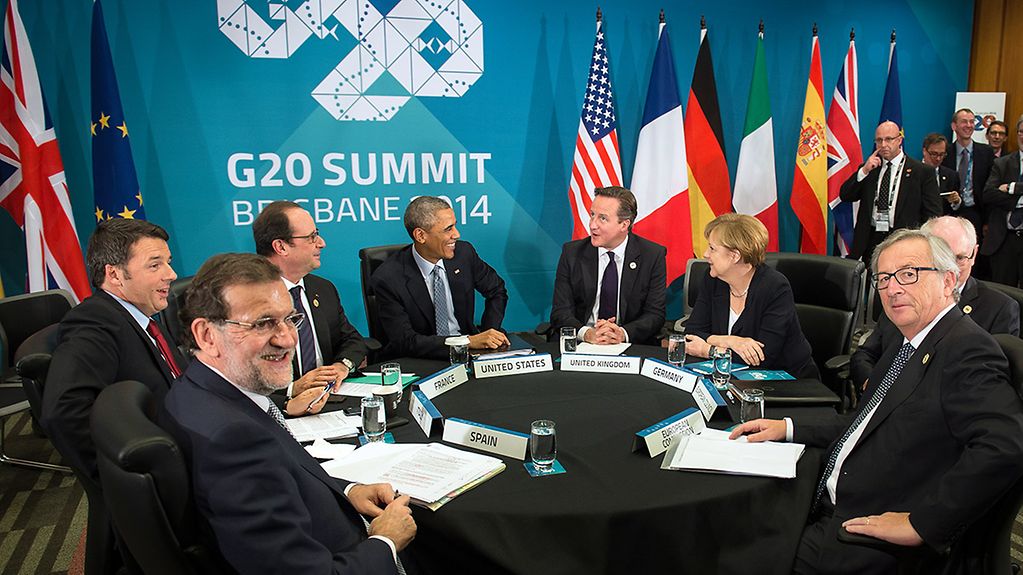Results of the G20 Summit
In Brisbane, the G20 heads of state and government have agreed on a package of measures to boost economic growth and improve climate protection. Federal Chancellor Merkel thanks the hosts for a very successful summit, which, she said, has made these results possible.
3 min reading time

Das geplante Freihandelsabkommen zwischen den USA und Europa besprach man am Rande des Gipfels.
Photo: Bundesregierung/Bergmann
There have been very positive developments, explained Federal Chancellor Angela Merkel on the second day of the talks in Brisbane. She reported on "extraordinarily exciting" and productive discussions about the economy, trade, financial market regulation, as well as climate and energy.
Speeding up growth
By implementing more than 800 measures, the countries plan to boost their collective growth by 2018 to a level that is 2.1 per cent higher than forecast in 2013. This faster growth is to create additional economic output and new jobs.
The Federal Chancellor stressed that she considers sound budget management and structural reforms as necessary prerequisites. The discussion was supported by the understanding that "in a global economy we are, of course, all very much linked together", said Merkel.
On the German side, she asserted "that Germany is working on two fronts with regard to the structural need to prepare for the future: on the one hand in terms of digitalisation and on the other in terms of research and development, as well as education." She referred to the demographic challenges facing Germany. There was also a positive response to Germany's plan to make additional investments, reported Merkel.
Facilitating trade
As regards the subject of trade, the Federal Chancellor sees progress in the direction of lots of regional and bilateral agreements. This includes talks between Europe and the USA on the transatlantic free trade agreement TTIP.
"What was quite apparent here, and what actually all the Europeans who spoke once again highlighted, was that we see the drive that has been achieved by trade agreements in the Asia-Pacific Region", stated the Federal Chancellor. As a result of this, the EU is under significant time pressure in its free trade agreement negotiations with the United States, she said.
Better financial market regulation
The G20 have made good progress with regard to financial market regulation. Systemically important banks are now regulated internationally. "This means that collapsing major banks no longer have the potential for blackmailing taxpayers to save these banks", explained the Federal Chancellor.
Now shadow banks need to be regulated, too, she said. The G20 Summit has submitted a timetable up to 2016 for this. "This is really important because, of course, if the banks are regulated there is the risk that these banks will be avoided in favour of shadow banks. And regulation will prevent this", said Merkel, explaining the background to the measures.
The automatic exchange of information in tax matters was also shown to be a success. "Here the OECD and the G20 have really achieved something very significant", said Merkel.
Progress in climate protection
Climate and energy were also discussed in great detail, said Merkel. The USA and China have agreed to obligations "that will bring us forward on our way to the climate conference in Paris", said the Federal Chancellor, delighted.
Next week the pledging conference for the Green Climate Fund will be held in Berlin. The USA is said to have announced a pledge of three billion dollars for this, while the Federal Republic of Germany will contribute a billion dollars and Japan intends to give 1.5 billion dollars.
The Green Climate Fund is a multilateral climate fund organised by the UN/United Nations. It funds climate projects in developing countries that serve to reduce greenhouse gas emissions and aid adaptation to climate change. Up to 2020, 100 billion US dollars are to be provided for this purpose.
Declaration on Ebola
The Ebola epidemic in West Africa is of global importance. At the start of their summit, the heads of state and government expressed their sorrow at the suffering in Guinea, Liberia and Sierra Leone in a statement on Ebola . They praised the efforts of the governments and people of the West African states in combating the epidemic.
The G20 members called on the world community to increase aid to the affected countries. Both emergency aid and long-term financial assistance are needed to minimise the effects of the crisis and guarantee long-term economic recovery, they said.